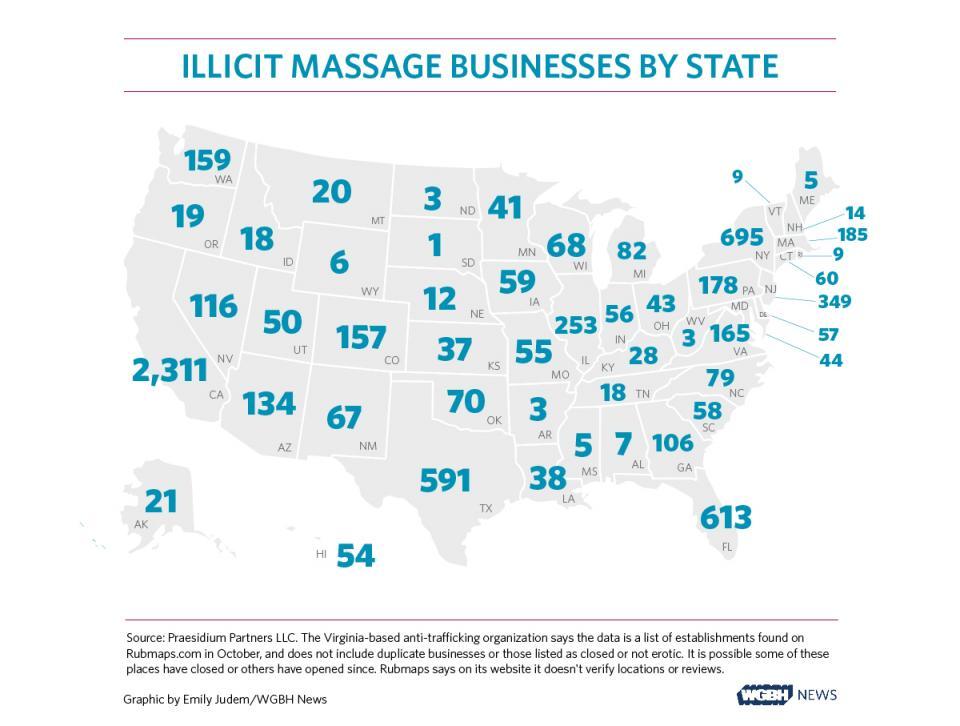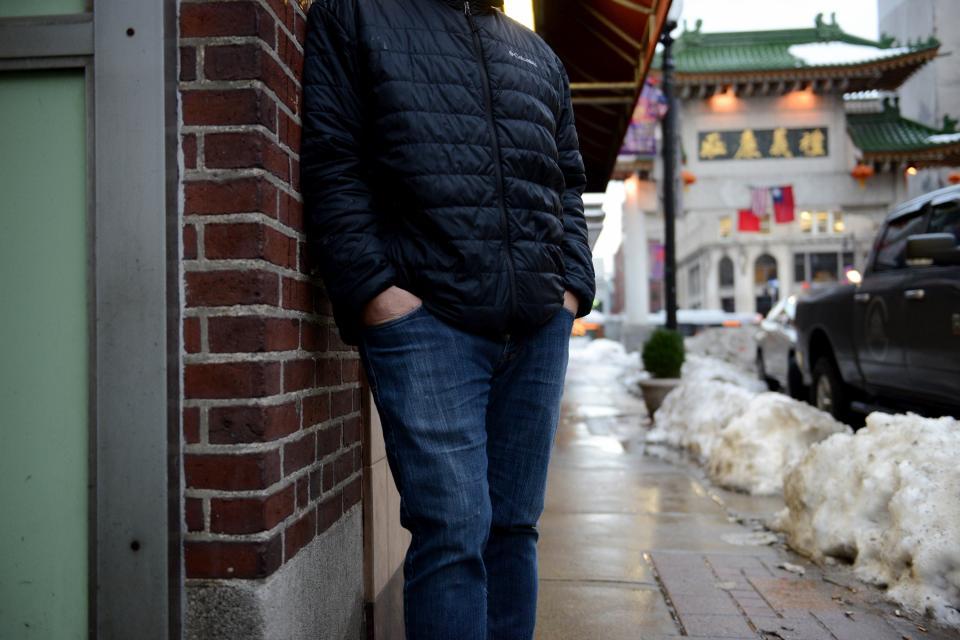A former sex buyer, now in recovery, revisits Boston's Chinatown where he sometimes frequented erotic massage parlors. He says such establishments are all over the state.
Editor's note: This story has been updated with a Feb. 19 interview on The World. Click the "play" button below to hear more from Phillip Martin and Jenifer McKim.
Prosecutors painted a squalid picture of what went on inside the little house on busy Russell Street: The Asian women were kept there night and day, providing sexual services for a fee, sleeping where they worked and rarely venturing outside except to take out the trash.
The customers themselves led law enforcement to the address in 2016, by writing detailed reviews of the services they received at Hadley Massage Therapy — services that went far beyond massage. On a controversial website called Rubmaps.com, they described their sexual experiences in detail, including how much they paid, what services they received and their level of satisfaction with the women’s performance.
“These are reviews on victims of human trafficking,’’ said Massachusetts Attorney General Maura Healey, whose office led the investigation into the alleged sex traffickers who ran centers in Hadley, East Longmeadow and Framingham. “It’s terrible, their depiction of women … It’s just truly appalling.”
The now-closed Hadley Massage Therapy is one of hundreds of erotic massage centers described on Rubmaps.com in Massachusetts alone — and there are some 7,000 nationwide.

But, even though law enforcement officials can easily find other suspected sex trafficking operations on Rubmaps.com and other so-called “John boards,” listings on these sites seldom lead to prosecution.
That’s because of the sheer number of businesses and the legal resources needed to take each one down. Shutting them down is not as simple as rounding up the men and women in the massage parlor. State and local officials say they don’t want simply to arrest women workers — who are increasingly considered victims — but take down the business operators who often run multiple storefronts.
Related: Read the first three stories of the five-part series: Illicit massage parlors are across Massachusetts. Why is police action so rare? and The women behind closed doors and The men who fuel the erotic massage industry.
Healey said her office will continue to go after the massage businesses described on the review boards. But even when law enforcement moves against erotic massage parlors, conviction of alleged traffickers is no slam dunk. The women, many of them fearful of deportation and unable to speak English, often make reluctant and poor witnesses. After being questioned, they often leave the state. The New England Center’s efforts to reach alleged victims from recent busts proved unsuccessful.
Donna Gavin, head of the human trafficking unit for the Boston Police Department, said police scrutinize review boards during investigations when they get tips about problematic addresses. But they have to be selective because investigations can be labor intensive, she said.
“We know they are all over the place,’’ Gavin said. “It is difficult to police.”
Indeed, the internet has been a boon for human trafficking generally, allowing sellers to easily and discreetly reach buyers without attracting attention. For example, cases of forced sex and forced labor reported to the National Human Trafficking Hotline increased by 35.7 percent in 2016 alone, ticking up to 7,572.
One sex buyer, a Boston-area businessman who requested anonymity to protect his family’s privacy, described spending tens of thousands of dollars on illicit massage parlors all over the world. He would have done it anyway, he said, but the internet made it much easier.
“Rubmaps took the guessing out of it,’’ he said. “It became a very powerful tool.”
In the end, he only stopped because his wife caught him.
Launched in 2010, Rubmaps.com, a site with the tagline “Where fantasy meets reality,” gets hundreds of thousands of visitors each month, according to the marketing firm SimilarWeb.com, making it likely the most popular John board dedicated to erotic massage.
The site, registered to a Georgios Veniaminidis based in Cyprus, is careful to distance itself from illegal activities. An online company statement maintains that the website is “100% user-generated,’’ and it is unknown whether reviews or addresses are accurate. The site also claims that it “has zero tolerance for underage prostitution and/or any type of sexual acts between unconsenting individuals, which includes sex trafficking.”
Rubmaps representatives did not return requests for comment.
But there’s little doubt about the web site’s focus on sex-themed adventure. The anonymous author of the site’s blog wrote last month about the benefits of asking for a “lineup” of women when entering a shop to avoid getting “a bored-looking, average-to-ugly old Asian lady.”
A few days later, he urged readers to try new places: “Be adventurous, find a new parlor in your area and write a good review for us!”
Writers, who describe themselves as “mongers” or “hobbyists,” give tips about how to avoid law enforcement, detail the ethnicity of women and grouse about less-than-enthusiastic services, records show.
One reviewer wrote in 2016 that he gave the woman an $80 tip, but wasn’t thrilled with her body type. “Will ask for a different more full-figured provider next time,” he said.
An analysis of the site provided by an anti-trafficking group, Praesidium Partners LLC, identified 185 active illicit massage parlors in Massachusetts. In addition, Rubmaps lists many parlors that are now closed.
Some, such as Los Angeles-based sex researcher and psychotherapist Christine Milrod, say the industry is comprised of buyers and many sex workers who choose their occupations without force or coercion, making the encounters a proverbial victimless crime.
“The men who participate in review boards are practicing a hobby that is non-violent and they presume that the women are willing participants,’’ she said.
But others such as Valiant Richey, a prosecutor in King County, Washington, believe many massage parlor women are exploited, forced into service through debt bondage, poverty and fear. He said review boards are fueling commercial sex by increasing demand.
Richey may be the first state prosecutor to go after reviewers for promoting prostitution, targeting the now-shuttered Seattle-based site, The Review Board. Thirty-five defendants, including brothel operators and reviewers of prostitution-related services provided mainly by Korean women, were charged last year. Most pleaded guilty to prostitution-related charges and a trial is pending in March for two remaining men.
The John boards “create vast online communities of sex buyers who share information, who encourage and normalize the conduct for each other and accelerate the rate of buying,’’ he said. “These are really toxic venues for exploiting people.”
A former sex buyer, now in recovery, revisits Boston's Chinatown where he sometimes frequented erotic massage parlors. He says such establishments are all over the state.
The debate about whether such sites are legal echoes a more public fight over Backpage.com, where thinly veiled advertisements for prostitution and erotic massage are easily found. Last year, the Supreme Court declined to hear an appeal from three sex-trafficking victims in Massachusetts who accused the website of helping to facilitate the abuse and exploitation of children.
The decision left in place a lower court’s ruling that federal law protects websites from being held liable for content its users publish on the sites. Other efforts to go after Backpage have been thwarted by the federal Communications Decency Act, which shields online platforms from liability.
Still, Sen. Robert Portman, a Republican from Ohio, and Claire McCaskill, a Democrat from Missouri, investigated the issue and determined Backpage.com knowingly facilitated sex trafficking. Last August, the lawmakers filed legislation meant to hold Backpage and other websites accountable by eliminating federal liability protection for websites proven to facilitate sex trafficking laws.
Backpage officials could not be reached for comment.
Prosecutors from Massachusetts to Minnesota detail cases where mostly foreign-born women work seven days a week, 12 to 24 hours a day, sleeping in parlors or nearby flophouses, and are managed by a network of interstate traffickers and business people.
In the Hadley sting, law enforcement found “makeshift sleeping quarters” in the house as well as two other facilities connected to operators. Some of the women said they’d never left the storefronts since starting work, court records show. Semen and sperm were found on doors, towels, walls, blankets and massage tables, court records show.
Now, Feng Ling Liu and Jian Song and their daughter Ting Ting Yin face charges of sex trafficking women from New York to Massachusetts, including at the Hadley Massage Parlor. All three have pleaded not guilty.
The Attorney General’s office has filed four massage-related cases since 2012 under the state’s anti-sex trafficking law, but it’s a slow process. So far only one has reached a conviction and in that case, prosecutors withdrew the sex trafficking charge to settle with a lesser prostitution-related plea.
Many argue that, without reducing demand, the problem will never go away. Nationally, the illicit massage industry generates roughly $2.8 billion in revenue annually, according to a recent study by two academics from Texas Christian University. With that much money on the line, sex traffickers often find new locations as soon as one is shut down.
Some anti-trafficking advocates are using Rubmaps as a tool to fight the industry. In Houston, a nonprofit advocacy group called Children at Risk is using review data to identify apparent illicit parlors and recruit volunteer attorneys to seek to shut them down for lack of licensing records.
For Shandra Woworuntu, a 41-year-old human rights activist and sex trafficking survivor based in London, viewing Rubmaps was a shock. Woworuntu said that she had been aware of review sites, but hadn’t read comments until a reporter showed them to her.
Woworuntu, founder and director of the New York-based Mentari Human Trafficking Survivor Empowerment Program, said she still is recovering from her brutal enslavement in 2001 in brothels, massage parlors and hotels along the East Coast.
“This is so shameful,” said Woworuntu, referring to Rubmaps. “How about if that woman is their wife, their daughter?”
A version of this story originally appeared on WGBH.This story was co-published with the Boston Globe.
